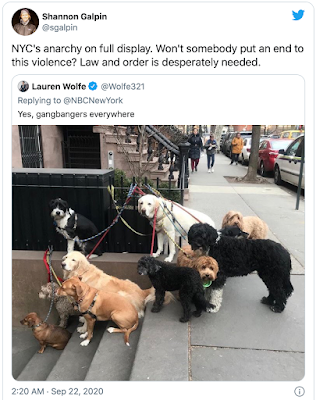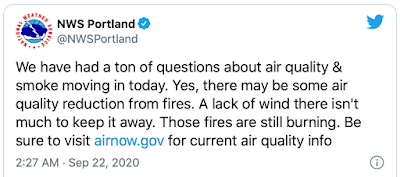Today's News . . . Today's Poem
The New Verse News
presents politically progressive poetry on current events and topical issues.
Guidelines
Submission Guidelines: Send 1-3 unpublished poems in the body of an email (NO ATTACHMENTS) to nvneditor[at]gmail.com. No simultaneous submissions. Use "Verse News Submission" as the subject line. Send a brief bio. No payment. Authors retain all rights after 1st-time appearance here. Scroll down the right sidebar for the fine print.
Wednesday, September 30, 2020
THE NORTH AMERICAN BLANKENSPIEL
OUR BODY POLITIC
by Vera Kewes Salter
to destroy soft-bodied insects
with its armored limbs
and giant ants use their
mandibles to sever
the mantis' narrow neck.
We sawed the limb
of the flowering cherry to protect
ourselves before the storm.
Now the wounded branch seeps
amber onto the blond wood
and green shoots grow.
There is a walnut tree that casts an even
shade and bears heavy lime-green fruit
but excretes toxic juglone that poisons
all growth on the ground
around and causes a permanent
blight even after it is felled..
Will our wounds
succumb to poison
or can green shoots grow?
Vera Kewes Salter lives and writes in New Rochelle New York.
Tuesday, September 29, 2020
GOODBYE, CHARON
FROM THE ANARCHISTS IN NEW YORK
proclaims we’re living in an Anarchist Jurisdiction,
when, of course, even he must know
we would never do a jurisdiction,
even if caught dead in one,
or quite by mistake were seen passing through.
We would like to make clear to him and, perhaps, to you
we’d be open to Misshapen Scrums;
and might even try Chance Encounters,
though would never admit to being present in one.
Some of our kind—
though we do not take kindly
to being so assigned, nor to a genus,
quorum, or even a voting booth—
believe a Flash Mob could turn out to be delightful fun.
However, none of us would organize one,
nor others we’ve met in passing admit their desire
to participate in any event so thoughtfully planned,
which, it’s widely agreed, is more appropriate
for Quaker Meetings, Church Bazaars,
Minyans, festive Quinceañeras, or Street Fairs
featuring stained-glass windchimes—
actually, co-locations of any kind.
And especially, God forbid—though we do not acknowledge
any such collective knowing—
even a benign and accidental jurisdiction.
Still, we thank you for your ill-intention.
Monday, September 28, 2020
NOVEMBER 2020
 |
| Wicked Wind by Tracey Savery Davis |
i.
the wind blew wicked hard that day
it howled and blew
it rocked the house
though I slept safe in bed
the storm did rise to hit the house
kill flowers through the land
tear branches down, fell ancient trees
yet did not touch my head
the storm rose up to strike our house
did everything it could
yet I and thee so deep in sleep
still breathed, slept easily
ii.
that wind had come to seize our day
it danced and whirled and groaned
to wake up all to hold the land
but somehow let us sleep
why would this wind stop at our bed
why would it prowl away
if not that you and I were here
and sought to sleep that day
That wind has come to call on us
leave eddies, pools in hearts
to cry to you to me who dream
You sleep, you welcome death.
Mary Clurman is a retired Montessori teacher and childcare professional in Princeton, NJ, taking her first class in writing poetry. She has only run for school board but remains aggressively progressive.
AFTER THE ELECTION
 |
| Lost Man painting by Irena Jablonski at Saatchi Art |
Sunday, September 27, 2020
PONDERINGS OF A HALF-DECENT (MAYBE) WHITE MAN
 |
| The White Man (1907) by Lyonel Feininger |
I'm so very tired
of the injustice.
I wonder how
exhausted I'd be
were I its victim.
I'm so very tired
of the racism.
I wonder how
exhausted I'd be
were I its target.
I'm so very tired
of the misogyny.
I wonder how
exhausted I'd be
were I its prey.
I'm so very tired
of the privilege.
I wonder how
exhausted I'd be
were I not its beneficiary.
Michael L. Ruffin is a writer, editor, preacher, and teacher living and working in Georgia. He posts poems on Instagram (@michaell.ruffin) and prose opinions at On the Jericho Road. He is author of Fifty-Seven: A Memoir of Death and Life and of the forthcoming Praying with Matthew. His poetry has appeared at TheNewVerse.News, 3 Moon Magazine, Rat's Ass Review, and U-Rights Magazine.
Saturday, September 26, 2020
MANMADE
 |
| In Chicago, 558 people have been killed this year. That is 158 more than 2019. (Data and graphic through Tuesday, September 22 from Chicago Tribune) |
Friday, September 25, 2020
THE WAY PAVER
FOR YOUR INFORMATION
 |
| Artist: Steve Brodner via Pinterest |
The oaks do not aspire
to spirit or imagination,
but grow straight up.
Indifferently
casting their shadows
over the saplings,
they search
for unopposed light
to fall from their canopy
into the shadowy ridged bark
of withered trees.
So too
there are human beings—
you know their names—
whose principles are limited
to domination and money.
They are called champions,
these proud lucky ones
that kill everything
that lives
beneath them.
Katherine Smith’s publications include appearances in Poetry, Cincinnati Review, Missouri Review, Ploughshares, Southern Review, and many other journals. Her short fiction has appeared in Fiction International and Gargoyle. Her first book Argument by Design (Washington Writers’ Publishing House) appeared in 2003. Her second book of poems Woman Alone on the Mountain (Iris Press), appeared in 2014. She teaches at Montgomery College in Maryland.
THE POOL BOY WHO BROUGHT DOWN THE FALWELLS
 |
| Giancarlo Granda, the former Miami hotel pool attendant whose accusations of an affair helped lead to Jerry Falwell's resignation from Liberty University last month, now lives in the Washington area. (Toni L. Sandys/The Washington Post September 18, 2020) |
Thursday, September 24, 2020
"PERHAPS YOU SHOULD ADOPT A MORE CONSERVATIVE POLITICAL ORIENTATION"
Katherine West is the author of three collections of poetry and one novel: Scimitar Dreams, The Bone Train, Riddle, and Lion Tamer, respectively. She has had poetry published in Bombay Gin, Lalitamba, Tanka Journal, Writing in a Woman’s Voice, and TheNewVerse.News who nominated her poem "And Then the Sky" for a Pushcart Prize in 2019. She lives in the mountains outside of Silver City, New Mexico where she translates Mexican revolutionary poetry and creates custom, hand-made poetry chapbooks.
BUT
 |
| Art by Clara Lieu |
more hospitable, less deadly—
if people agreed to do without guns.
But I’m the dread in his head, dwelling
on how many guns are already loaded,
how many aimed, how many already fired,
piercing lead already in the wounded, in the dead,
my thoughts having shot their way through
his fingers on to his computer screen:
“Time to buy a gun or two? Or stockpile
an arsenal?” Sure, he’s already deleted
those thoughts. But I’m the dread in his head.
William Aarnes lives in South Carolina.
Wednesday, September 23, 2020
THE LAST ELECTION
 |
| “The worst case,” [Barton] Gellman writes [in The Atlantic], “is not that Trump rejects the election outcome. The worst case is that he uses his power to prevent a decisive outcome against him.” Merely by refusing to concede, Trump could keep the electoral result in doubt through the 79-day period between Election Day and the day the next president is to be inaugurated. Gellman's reporting shows that Republicans are already discussing plans to bypass the popular vote and directly appoint electors to the Electoral College. This could lead the country to a precipice: Two men could show up to be sworn in on Inauguration Day. “One of them,” Gellman writes, “would arrive with all the tools and power of the presidency already in hand.” —Jeffrey Goldberg, Editor, The Atlantic in today’s email to subscribers releasing the magazine’s November cover story. |
PAEAN TO AUTUMN
DENIAL
 |
| Dying Sunflower is a photograph by Robert Ullmann |
The huge yellow-orange sunflower
once showy & tall & haughty
looked down on common
ordinary plant life.
Now petals gone devoid of seed
spine collapsing it does not
notice its season has passed.
THE CREW
Never enough love
for friends of our youth
some of whom get left behind
or so it feels
Hearing one of us went down
unnatural, too soon
I don’t know what to tell myself
with each fresh loss
I turn a little more inward
not ambiguous
layer on layer
What is it we all wanted for each other back then?
Glory? Fame? No―
togetherness
THE RACEHORSE THEORY
T***p tells white audience in Minnesota they have 'good genes.'
Only the best horses
the best of the best
genes all American
we have been told
winning is ours, it's
in the genes
In the genes
of the whitewashed
suburban picket fences
clean rural outposts
pristine fields, barns
purebred offspring
the best future
of the ultimate winners
of this gifted generation
history outpacing, outrunning
imagination so we cannot see
our dwindling
power dementia darkness
taking root.
Taking root
in the hayfields, cornfields
urban tracks and highways
bleachers and country clubs
of the best country
only the best
of the best of us
betting on the top
horse to win
at any cost.
At any cost
we run the track
we've run before
we keep losing
the best
of the human race
costing us
everything.
Originally from Boston, Mickey J. Corrigan writes Florida noir with a dark humor. Novels include Project XX about a school shooting (Salt Publishing, UK, 2017) and What I Did for Love a spoof of Lolita (Bloodhound Books, 2019). Kelsay Books recently published the poetry chapbook the disappearing self. Grandma Moses Press will publish the poetry chapbook Florida Man later this year.
Tuesday, September 22, 2020
THE YEAR 2020 WEST COAST FIRES
by Sister Lou Ella Hickman
 |
| An orange sky filled with wildfire smoke hangs above hiking trails at the Limeridge Open Space in Concord, California, on Wednesday. Photograph: Brittany Hosea-Small/AFP/Getty Images via The Guardian, September 9, 2020 |
IMPOSSIBLE
 |
| A neighborhood destroyed by fire is seen as wildfires devastate the region, Thursday Sept. 10, 2020 in Talent, Ore. (AP Photo/Paula Bronstein via The Record Searchlight) |
Two long days driving
through thick smoke
behind, ahead, behind
other fleeing drivers,
all going seventy, eighty mph
to get to air.
Diverted from inland to coast
from coast to inland—
fire grenades exploding
in the hills alongside,
confusing the confused
on the road through
Sweet Home
behind family
trailer homes
horse trailers
evacuating out of town
till I reach a motel
where I need news—
the radio
assures me at 5 pm—
stock market up a tad
China, a valuable resource
for released Disney film—
‘an impossible resource to ignore.’
HAZED AND DIFFUSED
landscape forming just past our bedroom
window my wife and I exchange mirroring
glances of hostile befuddlement
maddened by this man’s unfathomable
indifference to the bewilderment of
smoke flowing freely into his eyes
and down deep into his lungs despite
wearing a confident smile as he strolls
absentmindedly through his yard
pushing that obnoxious gas powered
machine to shorten the small strip of
parched grass that faces our still baffled
faces now visibly posing the inevitable question
what in the actual fuck is happening?
We continue to watch in shock as I frantically
google the news desperate to confirm that
yes in fact there are wildfires blazing at
our city’s doorstep in addition to riots and
shootings and protests and looting and tagging
and militias immersed in science refuting and
that this conundrum of a man tending to his plot
amidst the infiltrating remains floating in from
burning homes incinerated cars perished
businesses lost livelihoods vanishing forests
and melted memories isn’t just symptomatic
of some feverish dream or drug-induced vision
or mystical illusion or some grave delusion but
that our mutual astonishment is actual credible
physical proof of the resilience of our little remaining
sanity.
IMAGES OF THE OREGON APOCALYPSE
 |
| Scientists say that the wildfires in the West combined with drought and record heat waves could be triggering one of the Southwest’s largest migratory bird die-offs in recent decades. Photo Credit: Allison Salas/New Mexico State University via The New York Times, September 15, 2020 |
Is there any reason to write anything today
when ink on paper looks like soot
fallen from a malignant sky? The oneness
we dream about flies in this wind: their house
of forty years, the plastic wading pool and hose,
rake, car, Bible, gramma’s wedding pictures,
ash of curtain, ash of couch, ash of rug,
the soot is a negative of what all they had.
How many dead birds have you ever seen
in your life? One or two bounced off a window?
Maybe your cat was a bad actor or you
were the bad actor that let your cat roam.
But piles of the dead? The migrating dead
won’t be back next year. We didn’t really
know exactly how they found their way
in the first place.
Such great weariness. With flimsy masks.
Stay inside to not be sick – you’ve followed
that mantra for months. You can’t outwalk
this cloud. Or see from one bridge to the next.
The firefighters sleep in peril. And wake
in dark fatigue. You check your air numbers
every hour and somewhere else is flooding
under winds that twirl the birds.
CUSP OF WHAT COMES NEXT
 |
| The Bay Bridge and San Francisco skyline, seen from Treasure Island, are barely visible through Sept. 11’s hazy air because of smoke from the state’s wildfires.Photo: Nick Otto / Special to The San Francisco Chronicle, September 19, 2020 |
Avert your eyes. That window frames a post-apocalyptic sky. Standard issue.
Darkness at 9:00 a.m. Six months into one cataclysm; three-plus weeks into
another. Make no joke involving sword, famine, or beasts from the wild.
Solace is scarce. Mental shelves looted of stock a person needs for survival.
Inventory now includes next to no patience. Scant fortitude. Very little
good cheer. How to re-order, regenerate, when the supply-chain is depleted?
Impossible not to think the worst. You sketch a picture captioned, “The End Times
Loom.” Remembered images from other horror stories crush barriers hastily
built to keep reality out. Reptile brain advises flight, because
how could one even begin to fight such an enemy? We are the tiny creatures
around which ash swirls wildly in our inescapable globe. All those prior
chances to live and learn; to change the course of our headlong tumble
into climate chaos. Fifty-eight years since Silent Spring. Fourteen years beyond
An Inconvenient Truth. And us with two hands still over our eyes, two
over our ears and our merry mouths declaiming, “Move along! Nothing to see here.”




